The
visit to this Sri Kailasanathar Temple in Viluppuram city was a part of the
“Shiva and Vishnu Temples Visit in and around Viluppuram” on 11th
August 2024.
Moolavar : Sri Kailasanathar
Consort : Sri Brihan Nayagi / Sri Periya Nayagi
Some
of the salient features of this temple are….
The
temple faces east with a 5-tier Rajagopuram on the west. Balipeedam, dwajasthambam, and Rishabam are on the east side of the entrance. Stucco
Dwarapalakas are at the entrance of the maha mandapam. One Chozha period
Dwarapalaka is on the South side entrance to the maha mandapam. Moolavar is a little
big on a round avudayar. In koshtam, Dakshinamurthy, Lingothbavar, and Brahma.
In the praharam, Arumugar, Bairavar, Saniswarar, Somaskandar (Nalvar, two Pichadanars,
and Veerabhadra are in the ardha mandapam, and all three belong to the Chozha
period), Ambal temple, and Navagrahas.
Ambal
Periyanayagi is in a separate temple with sanctum sanctorum, antarala, and
ardha mandapam, which faces west. Ambal is in a standing posture with abhaya varada
hastam.
ARCHITECTURE
The
temple consists of the sanctum sanctorum, antarala, ardha mandapam, maha mandapam,
and mukha mandapam. The sanctum sanctorum is on a prati bandha adhistanam with
jagathy, vrudha kumudam, and prativari. The bhitti starts with vedikai. The
pilasters are Vishnu kantha pilasters with kalasam, kudam, palakai with lotus
petals, and poomottu pothyal. The prastaram consists of valapi with bhutavari, kapotam
with nasi kudus, and vyyalavari. The temple from adhistanam to prastaram was
built with stone. The vesara vimanam, above bhumidesam, is of two talas and was
built with bricks. Stucco images of Shiva, Dakshinamurthy, Maha Vishnu, and
Brahma are in tala and greeva koshtas.
HISTORY
AND INSCRIPTIONS
The
original temple belongs to the 11th to 12th Century
Chozha Period. The mandapas are expanded during the Vijayanagara period. An
underground room was found in this temple in recent years.
During
the Nrupathunga Pallava period, this place was called Vijaya Nrupathonga Cheyathangi Chaturvedi Mangalam, and during the Rajaraja Chozha period, Jananatha
Chaturvedi Mangalam, and Jayangonda Chozha Mandalam.
Also
called Vizhuparaiyapuram, which has been corrupted to the present name of
Viluppuram. Maravarman Sundara Pandyan period (1265 CE) inscription records that this place was called Viluppuram. Vaikuntavasa Perumal Temple Dwajasthambam
inscription records Viluppuram alias Janagapuri.
The
recorded inscriptions belong to Koperunjingan, Kulothunga Chozha, Rajanarayana
Sambhuvaraiyar, Sadaiyavarman, Viruppanna Udaiyar, Saluva Narasinga Udaiyar,
Narasinga Nayaka, Krishna Devaraya, Achuthadeva Maharaya, and Sadasiva
Devaraya.
The
temple was damaged during the 15th-century Vijayanagara period due to a flood, and the same was subsequently reconstructed.
Ambal
Periya Nayagi Temple Thirupani was started in the Tamil year - பிரசோற்பத்தி - Prachorpaththi,
Karthigai Month (Salivahana sakaptham 6790) and completed in the Thai month of
Angirasa Year, (Two years) by Somanatha Saravana Mudaliar. The Mudaliar
belongs to the Thondai mandalam. In this inscription, Ambal was called Sakala Bhuvaneswari
alias Periyanayagi.
LEGENDS
As
per the legend, the Dhurvasa Muni gave the garland, which was adorned with Shiva,
to Indra. Indra took the garland with Angusa and kept it on the head of the Airavata,
his white Elephant vahana. The Elephant took the garland and threw it on the
floor. Angered, Dhurvasa Muni cursed Indra to lose all his wealth and his
position as the Head of Devas. Indra went to Maha Vishnu and sought his help to
get rid of Dhurvasa’s Curse. Maha Vishnu advised Durvasa to drink amrita to
get rid of the Curse.
Indra, with the help of Devas and Asuras, churned the milk
ocean. Manthara Hill as Maththu, keeping on Maha Vishnu as Turtle (Koorma
avatar) and Vasuki as rope. In the process of churning, Vasuki couldn’t bear
the pressure and vomited the poison. Shiva took the poison and tried to drink.
In the meantime, Ma Parvati held the poison with her hands and stopped at the throat itself. The poison at the throat changed the colour into blue, hence
Shiva is called Thiruneelakandar. Shiva came to this place, Viluppuram, and
stayed as Sri Kailasanathar.
POOJAS
AND CELEBRATIONS
Apart
from regular poojas, special poojas are conducted on Pradosham, Maha
Shivaratri, Pournami, Amavasya, Sankatahara Chaturthi, Vinayagar Chaturthi,
Navaratri, Aadipooram, New Year, Thai Pongal, etc.
TEMPLE
TIMINGS
The
temple will be kept open from 07.00 hrs to 11.00 hrs, and from 17.00 hrs to 20.00
hrs.
CONTACT
DETAILS
The
temple’s mobile number is +919787104244, and may be contacted for further details.
HOW
TO REACH
This
temple is on Thiru Vi Ka Street, in Kamala Nagar, a part of Viluppuram City. The
temple is about 1.6 km from the Railway Station, 3.3 km from the New Bus Stand,
37 km from Tindivanam, and 166 km from Chennai.
The nearest
Railway Station is Viluppuram.
LOCATION
OF THE TEMPLE: CLICK HERE
Ambal temple
bas-relief on the Arumugar Temple wall
bas-relief on the Arumugar Temple wall
An Elephant and a camel bas-relief on the Arumugar Temple wall
bas-relief on the Arumugar Temple wall
bas-relief on the Arumugar Temple wall
---
OM SHIVAYA NAMA---



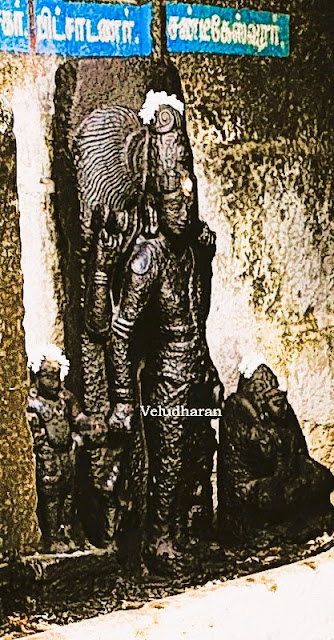


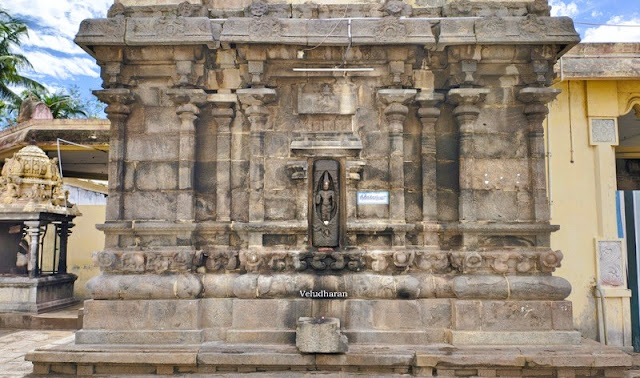



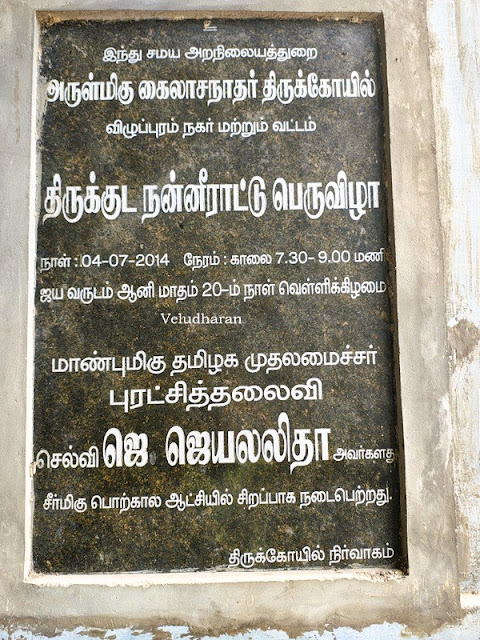







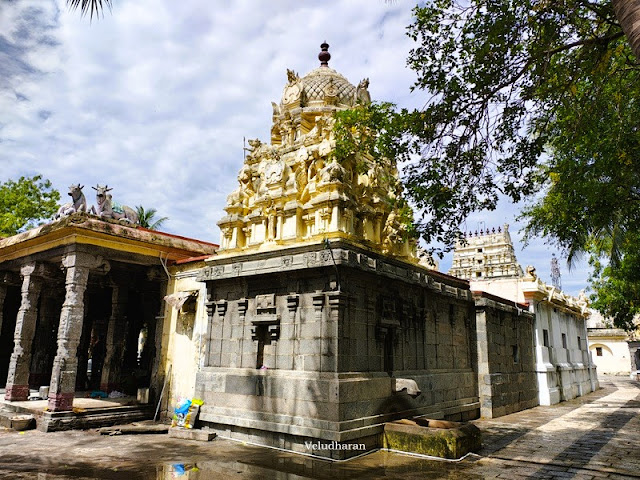
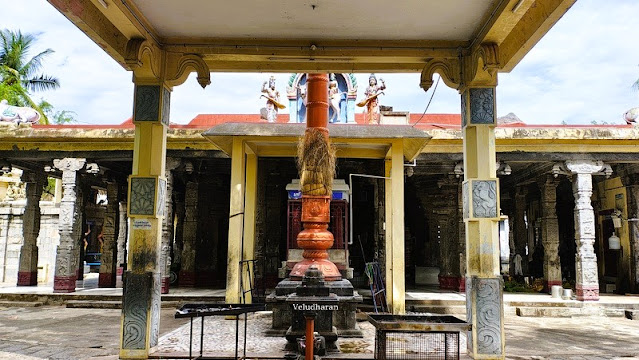





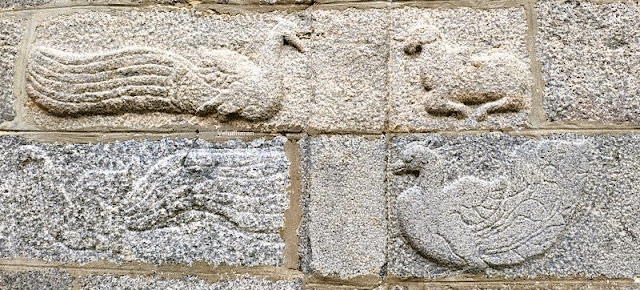

No comments:
Post a Comment